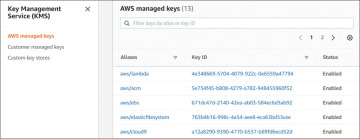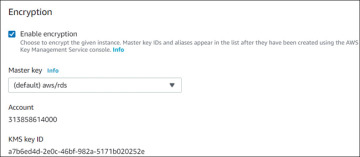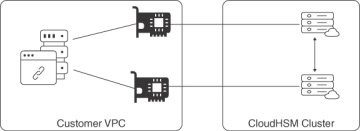AWS Key Management Service
AWS Key Management Service (KMS) lets organizations create, manage, and control cryptographic keys used to protect data records. AWS KMS integrates with AWS services that can encrypt data records (see Figure 5-15).

Figure 5-15 KMS Console
Organizations do not have to directly interface with AWS KMS to enable data encryption; instead, they can use AWS KMS services through more than 100 integrated AWS services, such as Amazon EBS storage, Amazon RDS, Amazon S3, Amazon EFS, Amazon FSx for Windows File Server, Amazon Aurora, and Amazon DynamoDB. When you enable encryption services using AWS KMS, a CMK is automatically generated in your AWS account for data encryption and decryption services. Organizations can choose to create one or more CMKs and use them to match their security requirements. A custom CMK allows you to control each key’s access control and usage policy; you can also grant permissions to other AWS accounts and services to use a specific custom CMK.
You can also choose to create symmetric CMKs, which use the same key to encrypt and decrypt data, or asymmetric CMKs, which use a public/private key pair (one for encrypting and one for decrypting).
The most common way to use KMS is to choose which AWS service will encrypt your data and select the CMK from within the AWS service itself; for example, you can encrypt an RDS database volume, as shown in Figure 5-16.

Figure 5-16 Generating CMKs with KMS for an RDS Instance
Envelope Encryption
KMS uses a process called envelope encryption to encrypt data at rest. It involves two layers of encryption: the first layer encrypts the data using a key generated by the organization, and the second layer encrypts the customer-generated key using a key that is managed by the AWS Key Management Service (KMS). This process enables each organization to retain control over their encryption keys and also enables them to rotate and manage the keys as needed, while still benefitting from the security and reliability of using the KMS for encryption key management. When you need to encrypt data, KMS generates a data key that is used to encrypt the data locally within the AWS service or application. The data keys are also encrypted under the organization’s CMK. When it’s time to decrypt your data, a request is sent to KMS to decrypt the data key (that is, the data key copy that was stored with the encrypted data) using your CMK. The entire encryption or decryption process is logged in AWS CloudTrail for auditing purposes.
Organizations that choose to import 256-bit symmetric keys into AWS KMS for compliance requirements are responsible for managing the imported keys’ expiration dates.
In addition to encrypting your data, AWS KMS provides other security features to help protect your encryption keys:
Key management: As an administrator, you can create, rotate, disable, and delete the CMKs that are used to encrypt your data. You can also view the key policy for a CMK, which specifies who has access to the CMK and what actions they can perform with it.
Access control: Organizations can use AWS IAM policies to control who has access to their CMKs and what actions can be performed with them. For example, users can be granted the ability to encrypt data using a specific CMK, but not to decrypt it or change the key policy.
Auditing: AWS KMS logs all API calls to AWS CloudTrail so organizations can track who is using each CMK and for what purpose. Auditing can help ensure that encryption keys are being used securely and in accordance with an organization’s security policies.
Key material: KMS stores the key material for your CMKs in secure hardware devices called hardware security modules (HSMs). This helps protect the security of each organization’s keys and ensures that they are only accessible to authorized users.
Key rotation: CMKS can be configured to automatically be rotated on an annual basis, to help prevent security breaches.
AWS KMS Cheat Sheet
For the AWS Certified Solutions Architect – Associate (SAA-C03) exam, you need to understand the following critical aspects of AWS KMS:
AWS KMS can be used to create symmetric keys within a custom key store such as AWS CloudHSM.
An organization’s symmetric keys can be imported for use with AWS KMS.
AWS KMS can create symmetric and asymmetric data key pairs for application use.
CMKs can be automatically rotated annually.
CMKs can be disabled and re-enabled.
AWS KMS keys can be audited with AWS CloudTrail.
AWS CloudHSM
Instead of using the default AWS KMS store, you can create a custom key store using a VPC-hosted AWS CloudHSM cluster and authorize KMS to use it as its dedicated key store. AWS CloudHSM clusters are created using multiple single-tenant hardware devices (see Figure 5-17). Amazon maintains the AWS CloudHSM hardware and backs up its contents but never enters an AWS CloudHSM device. Organizations might use an AWS CloudHSM deployment if compliance rules explicitly require that encryption keys are protected in a single-tenant hardware device. AWS CloudHSM can operate as a complete stand-alone hardware device for your synchronous and asynchronous keys and provide you with Federal Information Processing Standard (FIPS) 140-2 Level 3 compliance.

Figure 5-17 CloudHSM Design